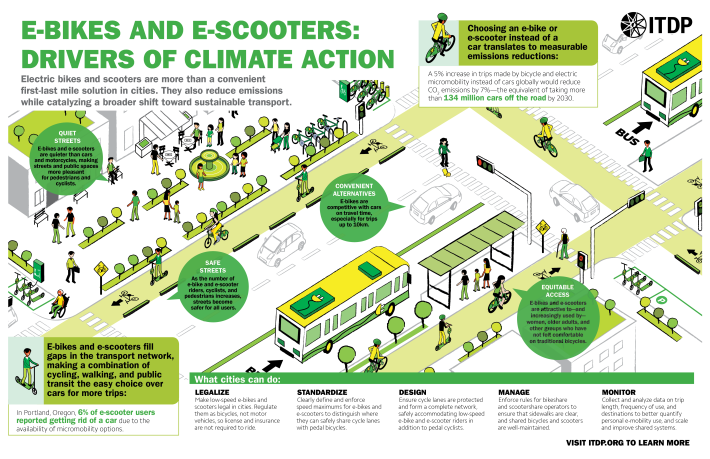As states across America prepare to start subsidizing the purchase of e-bikes to get people out of cars, Vermont just quietly became the first one to actually do it.
On July 1, thousands of residents across the Green Mountain State became eligible for new point-of-sale rebate that gives them up to $400 towards the purchase of a new pedal-assist bicycle, depending on their income level. The innovative pilot program, which was approved just last year as part of a wider effort to curb greenhouse gas emissions in the state, is explicitly aimed at "reduc[ing] vehicle miles travelled in personal automobiles." And if previous research is any indication, they'll likely succeed: between 35 and 50 percent of trips on e-bikes purchased with a government incentive replace an automobile trip.
Dozens of local and regional e-bike incentive programs have proliferated across America in recent years, but efforts to deliver discounts statewide have yet to actually start putting subsidized bikes in residents' hands. A much-publicized $10 million effort to boost electric cycling in California, for instance, only appointed an administrator last week, while rebates in Colorado, Connecticut, Hawaii, and Massachusetts have also been signed into law and funded by lawmakers, but aren't quite delivering discounts yet. Programs in New York and Oklahoma, meanwhile, have been proposed but not yet signed into law, while a wildly popular rebate program in Denver, meanwhile, wasn't offered to Coloradans beyond the boundaries of the Mile High City.
The folks behind the Vermont program, though, say that thinking beyond the municipality has some serious advantages, and more communities may want to follow suit.
"It’s early on in the process, but our perspective is that a statewide program can bring a level of standardization that ultimately simplifies things a lot and can make these programs more effective in some ways," said Mark Bielecki, senior director of transportation programs for the Center for Sustainable Energy, which administers the program.

Bielecki acknowledges that structural reasons are probably a big part of why Vermont got its e-bike rebate across the finish line so fast.
At just 624,000 people, the New England community is the second-least populous state in America, and it already had five active local e-bike incentives before the state streamlined them all into one program, according to a national tracker from the Transportation Research and Education Center. That means that many Vermonters have already snagged their rides, and that the new pilot money will be able to stretch a little further.
That pot of money, by the way, is only $92,500 — pretty much a rounding error compared to the $12.3 million in incentives the state will offer for electric cars this year — and the value of each individual credit is fairly small relative to other cycling-focused programs. A married couple making filing jointly, for instance, would recoup as little as $250 if they grossed an adjusted maximum of $125,000 a year, while the generous Denver rebate offers a minimum of $400 a year to all residents, with some low-income individuals qualifying for a staggering $1,700 if they buy cargo bikes. (And needless to say, the Vt. program pales in comparison to countries like France, which just expanded its e-bike credit for low-income residents in certain areas to nearly $4,000 USD.)
Bielecki says that while Vermont undertook a meaningful stakeholder process to determine the initiative's scope and income limits, that process might have been a little simpler given the state's tiny size. (Some advocates might suspect state's astonishing lack of diversity could have also been a contributing factor.)
"A lot of the e-bike initiatives that are happening across the country involve a lot of community-based organizations, advocacy groups, retailer networks and other groups that are involved in shaping what the program looks like — and that can kind of draw things out," Bielecki said. "Vermont did that too, but they were definitely able to pass the legislation and move on to implementing the program pretty quickly."
We're proud that Vermont is the first US state to offer an e-bike subsidy. Now, let's think bigger! https://t.co/Qs8nVdJOKZ
— Local Motion (@LocalMotionVT) August 25, 2022
Even if their success might be hard to replicate in larger communities, there's still much to admire in the Vermont's e-bike effort — and not just how fast it's getting people out of cars.
Bielecki points out that the state-wide program may prove more sustainable in the long run, since it's now impossible for Vermonters to hop from municipality to municipality and buy multiple subsidized bikes through local rebates. The new program will compensate for that constraint by permitting participants to buy from out-of-state and even online retailers, opening up a range of far cheaper direct-to-consumer bikes that can help maximize the discount's value. For those who prefer to buy local, a long list of participating shops will be able to pass the incentive directly to consumers the instant they buy if they present a Vermont state ID and a simple form to verify their income.
Those those retailers, Bielecki says, have been crucial in getting the word out to those most likely to use their bikes for transportation, which is the state's primary goal.
"A statewide model can still have that sort of localized, community-driven angle to it; that’s where these dealer networks really come into play," he said. "They are the ones who serve local communities, they know their community members, and they tend to have repeat customers."
However they choose to structure their programs, Bielecki is confident that more e-bike incentives are on the horizon in U.S. communities – including at the state level.
"Vermont is the first to do this, but there are several others that are going to be close on the heels," he said.






